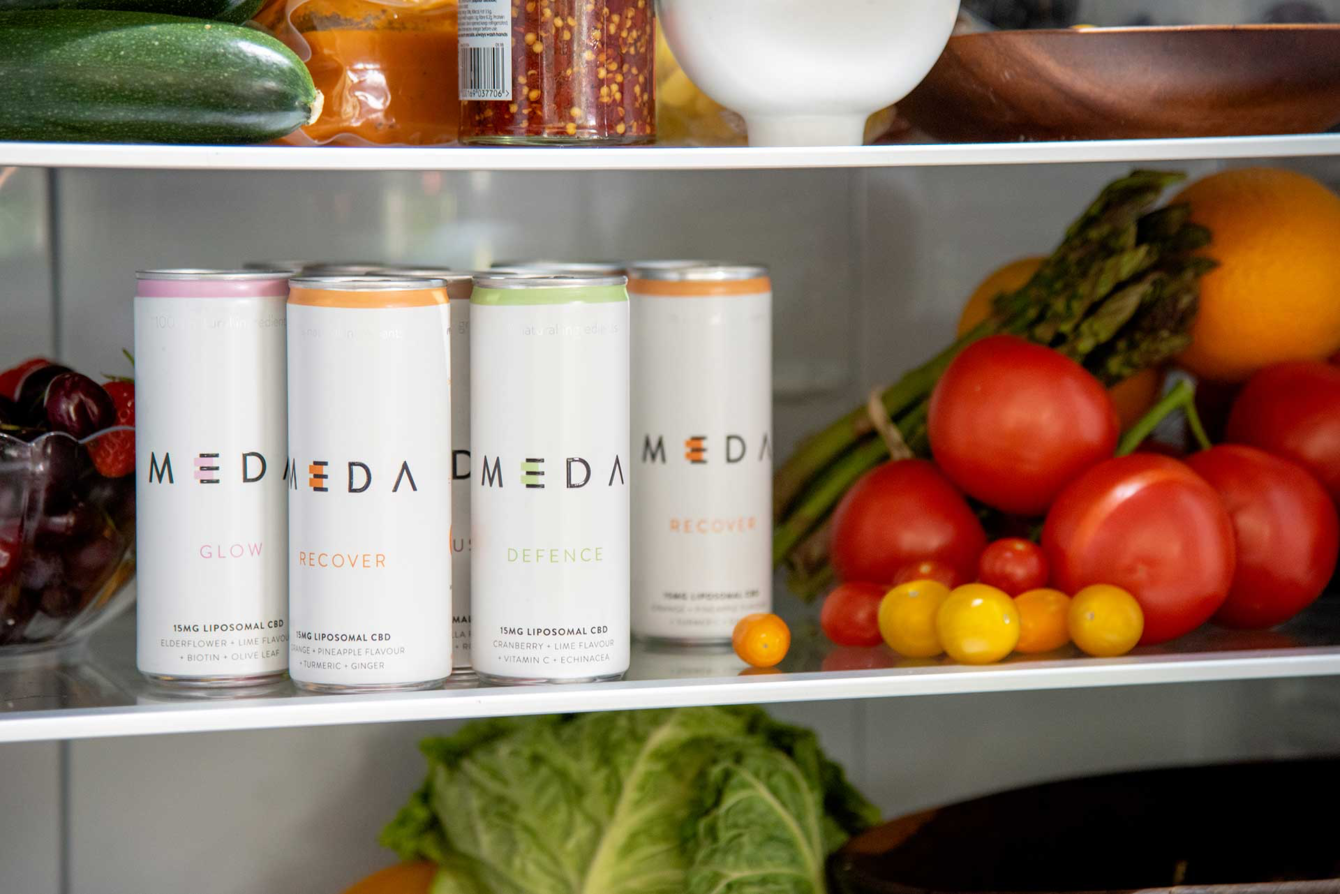
We’ve only got one liver and it is a vital organ. Our liver is responsible for making glucose from carbohydrates, storing nutrients, creating bile for fat break-down and cholesterol. It also helps us eliminate waste products and toxins and it even plays a role in our immune system health. And did you know that the liver is the only organ in the body that can regenerate!
While for most of us our liver works the way it should occasionally it could do with some TLC. Read on below to learn how we can support our liver health through diet.
Be mindful of fats
Fats are a fantastic source of fuel and the right kind of fats help us produce hormones, protect our nerves and play a role in cognitive health. However, intake of trans and saturated fats can impact the health of the liver as well as cardiovascular health. Be mindful of your intake of margarines, excess vegetable oils and fried foods and opt for using olive oil, nuts and seeds.
Get in that fibre
Fibre from our diets can help stimulate enzymes in the liver and can encourage bile acid function needed for liver metabolism and absorption of fats. A diet low in fibre can put further pressure on the detox pathways in the liver. Without fibre our digestive systems don’t clear out as much of the debris and by production of waste from our food – leaving the liver overworked!
The recommended daily intake of fibre is 30g per day; so focus on foods such as nuts, seeds, veggies and fruit, pulses and wholegrains.
Moderate your alcohol intake
Alcohol and the liver are not friends. The liver tolerates alcohol but when alcohol comes over a little too often the relationship turns sour. While moderate alcohol consumption is normal and our bodies are equipped to tolerate it, if we consume alcohol in significant amounts and consistently, we can put too much pressure on the liver. Try out lower or non-alcoholic alternative such as MEDA’s NO-LO range which also contains CBD which has been linked in some studies to be potentially liver protective. [1]
Coffee makes your liver smile
Coffee gets a bit of a bad rep but when it comes to the liver the science is in – your daily cup of joe can actually be a good thing!
Studies have linked coffee consumption to a reduction in liver cancer, liver fibrosis and progression of liver disease.[2]
Keep to under 400mg of caffeine from coffee per day (that’s roughly 5 espresso shots). For further reading, check out the British Liver Trusts advice here: https://britishlivertrust.org.uk/wp-content/uploads/The-health-benefits-of-coffee-BLT-report-June-2016.pdf
Hydrate. Hydrate. Hydrate.
The liver, like many organs in the body, requires hydration to function optimally. Ensure you are getting in your H20 even in the colder months ahead. If you find it a struggle to hit your 1.5-2 litres every day try adding in herbs, berries a drop of cordial or half a can of one of MEDA’s CBD drinks.
Please note if you have any chronic condition or liver disease please work with your medical practitioner. This advice is not to be used as a supplement for medical care and is not intended to diagnose.
[1] https://www.ncbi.nlm.nih.gov/pmc/articles/PMC4112960/
[2] https://www.sciencedirect.com/science/article/abs/pii/S104727970100223X
https://www.sciencedirect.com/science/article/abs/pii/S0016508507005689
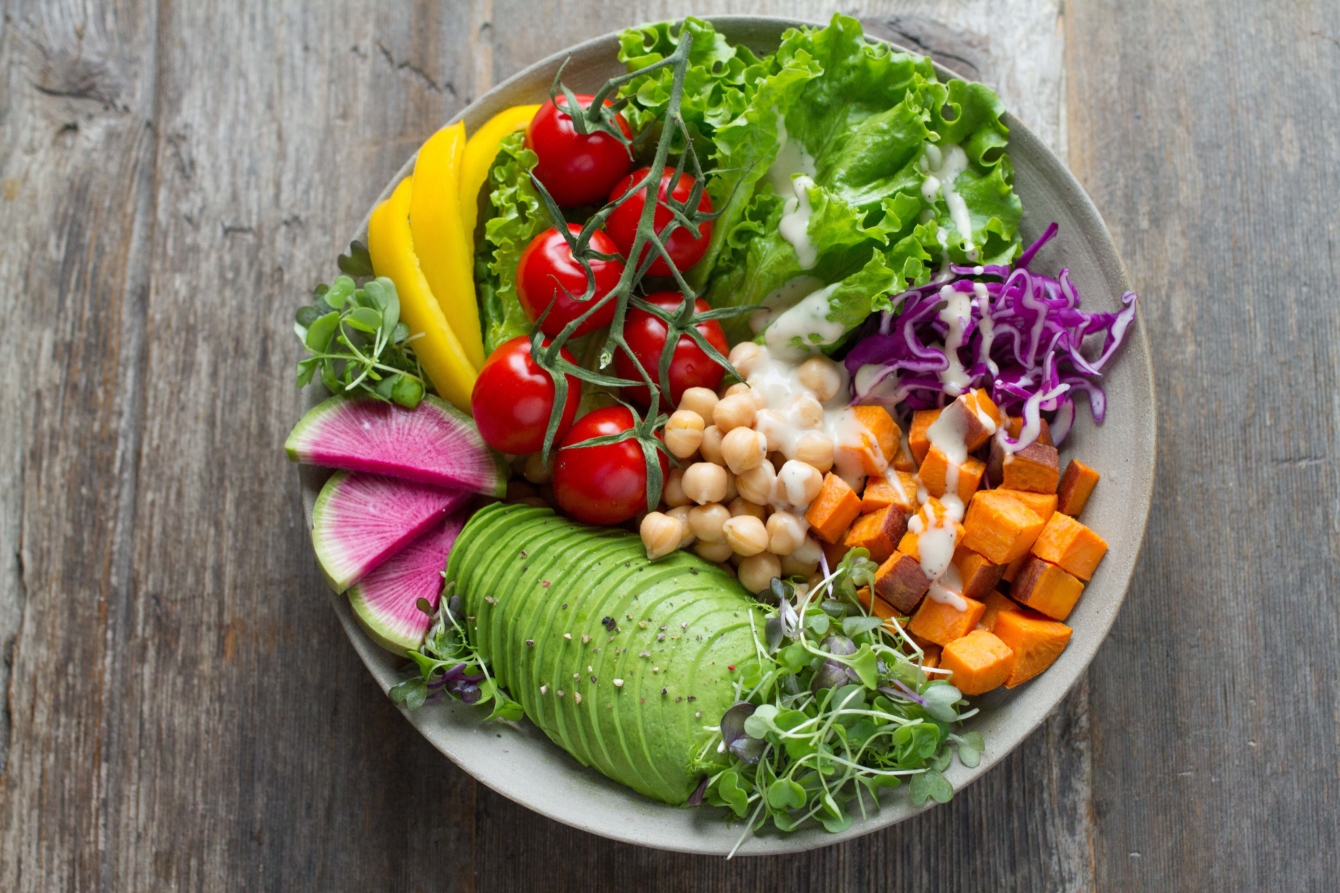
We have the power to bring down inflammation through the foods we choose to eat so forget the medicine cabinet and let your fridge hold the answer to reducing inflammation and preventing disease. Read on for our resident Nutritionist’s tips to following an anti-inflammatory diet.
What is an anti-inflammatory diet?
Inflammation is our bodies natural immune response but when we have chronic or long-term inflammation we can be left with symptoms or disease progression. Many foods can increase or prompt an inflammatory response while others can protect from or reduce inflammation.
By following an anti-inflammatory diet you are reducing inflammation and improving overall health. The Mediterranean diet filled with veg, fruits, wholegrains, fish and healthy fats is a great eating plan to consider.
Inflammatory foods to be removed
Sugar
Over consumption of sugar causes your body to release inflammatory messengers called cytokines. Aim to keep your added sugars under 30g per day and opt for natural sugars from fruits.
Refined carbohydrates
Refined carbohydrates such as white breads, pastries, pastas etc are those that have had the fibre removed from them and tend to shoot our blood glucose levels up. Fibre helps balanced blood sugar levels, keeps us full, helps our bowel movements and our gut.[1] Intake of refined carbohydrates has been linked to the growth of inflammatory gut bacteria.
Swap to wholegrain options such as oats, brown rice and quinoa.
Processed foods
Burgers, fries, pastries, crisps, junk foods, processed meats and fizzy drinks – these processed foods have been stripped of nutrients or have added sugars, stabilisers, preservatives, colours etc tend to be low in nutritional value and higher in pro-inflammatory ingredients. Opt for fresh food cooked from scratch when possible.
Anti-inflammatory foods to include
Antioxidants
Antioxidants can help to reduce oxidative stress which plays a role in inflammation production and can help to repair cell and tissue damage caused by inflammation! They are mostly found in colourful fruits and veggies such as berries, squashes, greens, beetroots, turmeric, ginger and green tea.
Eat more plants
Vegetables and fruits contain many of the nutrients we need for bodily processed as well as anti-inflammatory compounds. Eat a rainbow of colours at every opportunity!
Healthy fats
Olive oil, nuts and avocado all contain monounsaturated fats which are anti-inflammatory and fantastic for heart health. Use these in your diet regularly.
Omega-3 foods
Omega-3 fatty acids play a role in regulating your body’s inflammatory process as well as being fantastic for brain, nervous system and heart health. You can find omega-3 fats in oily fish such as salmon, mackerel, sardines and in plant-based sources such as walnuts, pecans, flax and chia seeds.
Wholegrains and pulses
Both these food groups are high in fibre which can help feed our beneficial gut bacteria, helping them to produce inflammation reducing compounds such as short chain fatty acids. Plus they also tend to be filled with nutrients and some antioxidants. Opt for quinoa, oats, brown rice, wholemeal pasta, lentils, chickpeas and beans.
[1] https://pubmed.ncbi.nlm.nih.gov/22826636/

Many of us know that eating a healthy diet is going to be beneficial for our physical health but are you aware that the foods we do and don’t consume can also impact our mental health? Our resident nutritionist Clarissa Lenherr shares her insight on the link between nutrition and mental health and how we can use diet to support our mood.
The Relationship
Think of our bodies like an engine. An engine needs a particular kind of fuel to function optimally. Give it the wrong fuel and it might begin to slow, break-down and act up — give it the right fuel and it will perform like a racehorse! If we supply our bodies with healthy fuel from our diet we are giving our cells energy, providing our brain with resources to support cognitive functions, and delivering the building blocks needed to create neurotransmitters and hormones. All of these things impact our mood. There are several elements that contribute to this premium fuel source for optimal mood including eating balanced plates for energy, nutrient intake/deficiencies, gut health and consumption of stimulants. Let’s delve into each one.
Balance your Blood Sugar
When your blood sugar is on a roller coaster ride all day, your mood is likely to follow suit. Ever wonder why you get irritable and frustrated when you skip a meal? Over consumption of sugars, refined carbohydrates, alcohol and skipping meals contribute to low and high blood sugar. Not only can these fluctuations in blood sugar impact physical health which puts stress on many body systems — they can also affect your emotional well-being. Aim for well balanced meals at every opportunity combining good quality fats, protein, complex carbohydrates and plenty of fruit and veg.
Focus on Nutrient Intake
Did you know that certain nutrients including B vitamins, Vitamin D and Magnesium all play a part in our energy, relaxation, brain function and mood. Aim to include variety and multi-colours of fruit and veg when you possibly can to ensure you are getting in adequate nutrients through your diet. When it comes to Vitamin D, the NHS recommends that between the months of October to April that people living in the UK take a low dose vitamin D supplement of 10mcg to avoid deficiency. This is down to the fact that our optimum source of Vitamin D comes from the sunshine, which is sparse during the summer months.
Support your Gut Health
Our gut has been named our second brain and for good reason! Over 95% of serotonin, one of our neurotransmitters responsible for feelings of happiness, is created in the gut. Read more here on the link between our mood and gut health, and what we can do about it. https://medahuman.com/how-having-a-healthy-gut-can-help-your-mood-the-science/
Be Mindful of Stimulants
Caffeine and alcohol can often be a trigger or potentially exacerbate your mood/mental health concerns. When we consume caffeine, our bodies produce stress hormones in response. These stress hormones can then go on to trigger mood swings and feelings of stress, which is not ideal when you are trying to manage your mood. Alcohol is a known depressant and can effect our mood, energy, immune system and sleep when consumed frequently. If you notice that you feel anxious, irritable, low in mood or jittery when consuming these beverages then aim to reduce and/or eliminate them from your diet. One way to potentially offset some of the side effects of caffeine and alcohol is to pair your drink with CBD which anecdotally can help people feel calmer and less jittery. Check out MEDA Calm and MEDA Focus for a soothing and stimulating beverage replacement.
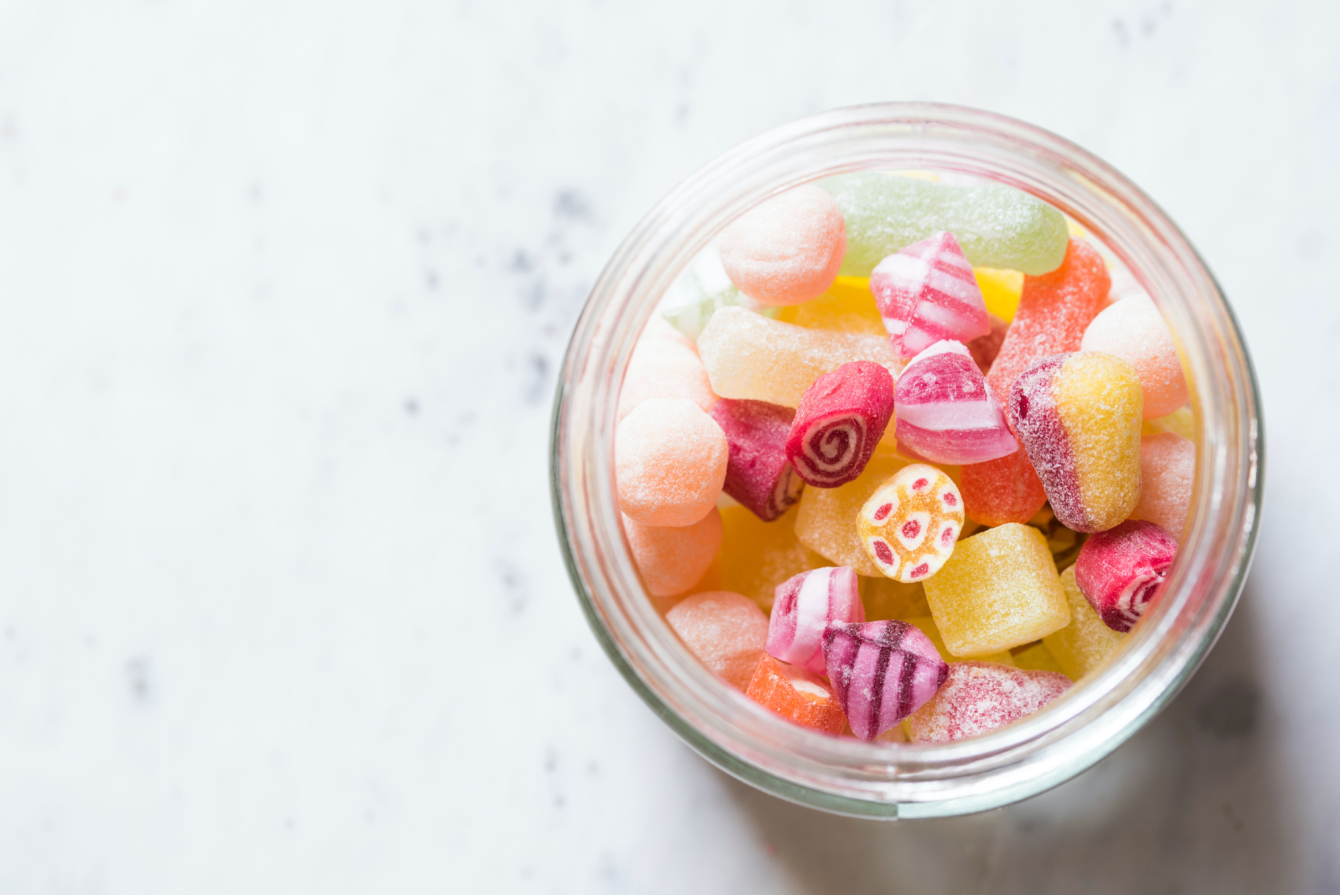
We’ve all been there. Whether it is that 3/4pm afternoon slump, triggered by lowered mood or just fancy a sweet boost, when the sugar cravings kick in and you give in to temptation; your happy and pleasure levels rise as a result, providing a blissful high; however, soon after, you’re on a downward slope of energy.
This is otherwise known as the blood sugar rollercoaster, which can send our energy, mood, productivity and general wellbeing up and down all day! When our energy is low and we trough, our body sends signals to our brain to tell us to find quick energy to get us back up into a normal blood sugar/energy range. And those quick energy sources tend to be found in foods containing large amounts of sugar – and ta-da, sugar cravings! Unfortunately, if we consume highly sugary foods when this occurs, we get a peak and another fall, setting us back up into the same situation.
While ignoring these cravings is easier said than done, there are some easy tricks you can use to effectively overcome your sweet tooth.
- Balance your blood sugar levels
Start balancing your blood sugar levels. You can do this by eating healthy balanced meals with protein, good quality fats, complex carbs and veggies galore. Often when people skip fat in their meals, they can be left grazing all day or reaching for sugar to tide them over. Add olive oil, avocado, nuts or seeds to dishes to keep you full. Ensure you have a source of protein at each meal or snack to help balance your blood sugar levels and keep you satiated. E.g. eggs, nuts, seeds, beans, pulses, dairy, meat, fish etc.
- Vamp up naturally sweet options
Fruit can be a great way to get a touch of sweetness and a whole bunch of nutrients! However, for many of us, fruit just doesn’t cut it! Try teaming fruit with something more filling and decadent. For example dip strawberries in some 70% plus dark chocolate, or team half a banana or apple with some runny crunchy nut butter!
- Notice Stress Eating
Learn to listen to your body and be intuitive. If you begin to notice that your reach for sugary foods when you are stressed/anxious/sad/happy/excited, then try to break this behaviour. Instead, replace a habit with a habit and adopt a different technique such as going for a walk, calling a friend, making a cup of herbal tea or getting into nature.
- Always be prepared
Avoid your blood sugar getting too low by always being prepared with a few nuts, oatcakes and boiled eggs, a homemade protein ball or roasted chickpeas to help with those hunger pangs when they pop up.
- Get Creative in The Kitchen
Having some healthy sweet treats to reach for when those cravings come around can be a game changer. Batch cook a bunch of healthy muffins/cookies/protein bites and keep them in the freezer. Defrost one at a time when you feel like something sweet. Clarissa’s go to are here oat and chocolate chip cookies, recipe here – https://www.instagram.com/p/B-l5rtuH8rg/
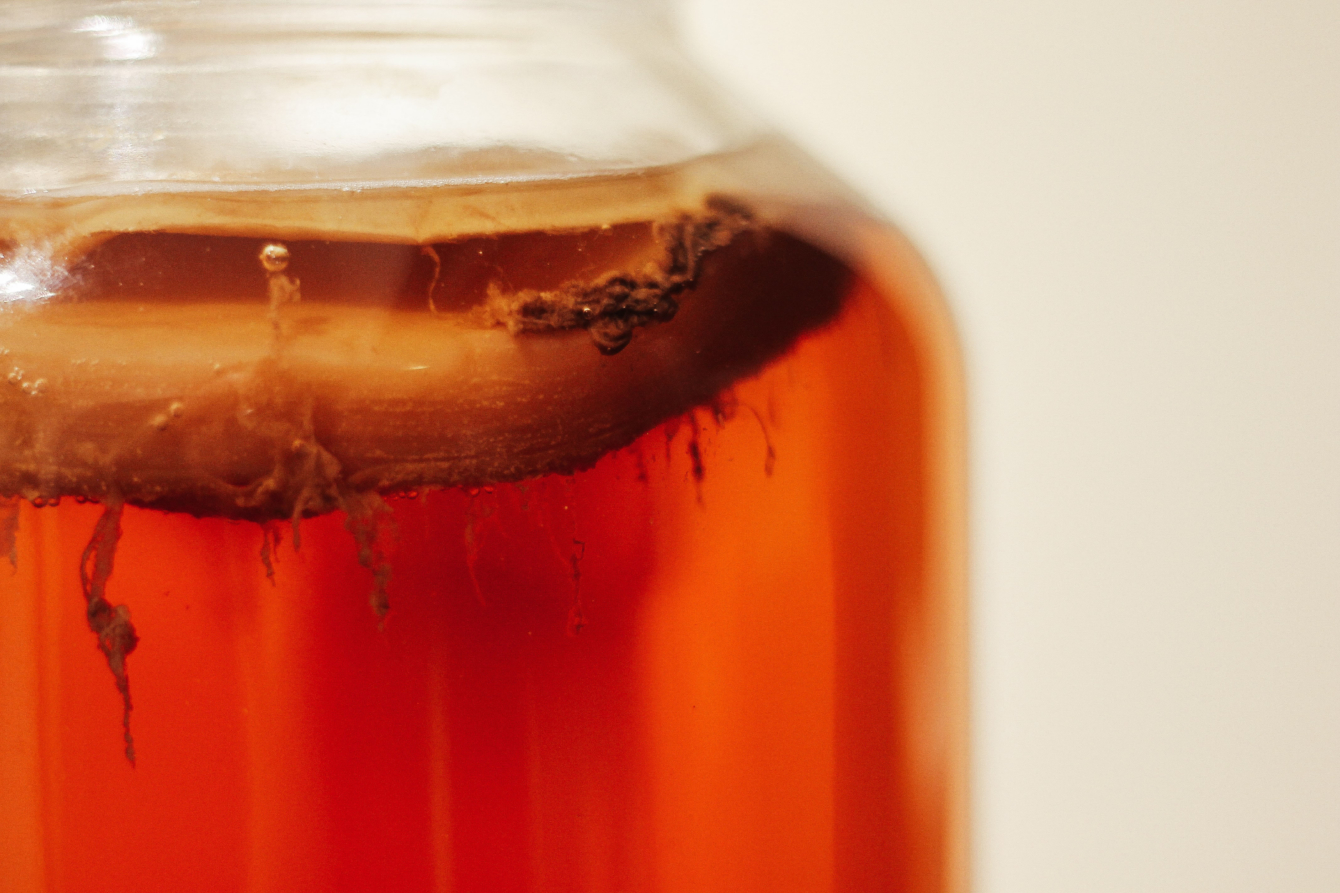
Welcome to Part II of MEDA’S gut health vs mood series. Now that you’ve read the science (if you haven’t, you can find the piece here) we want to equip you with the top five things you can do to boost your gut health and consequently your mood.
Introduce probiotic rich foods
Probiotic rich foods are foods that are live with gut-friendly bacteria that are beneficial for our digestive system. And no, we are not talking about eating your 3-month-old cheddar covered in blue fuzz, we are talking about fermented foods. Fermented foods are foods that have undergone fermentation and microbial growth in order to provide us with advantageous bacteria. Our favourites include: Kefir, Kombucha, Sauerkraut, Kimchi, Live Miso and Live Yogurt. Try incorporating these 3-5 times per week to reap the rewards.
Incorporate prebiotic rich foods
Our existing, or newly added friendly bacteria, need fibre to feed off and thrive. And this is where prebiotic foods enter in. Prebiotic foods are those that are rich in insoluble fibre and hard for our digestive system to break down. Why is this good you may ask? It means the fibre makes it to the intestines still intact, giving our bacteria the opportunity to feed off them. Good bacteria, fibre-rich prebiotic foods to reach for include: raw garlic, onions, Jerusalem artichokes, flax seeds, apples and oats.
Eat the rainbow
Variety is key for the trillions of bacteria that reside in our gut. The more plant-based, colourful foods you can incorporate into your diet, the better your gut bacteria will dine! Aim for 20/30 different plant-based foods in your diet per week. A top tip – reach for foods you’ve never tried before that are in season.
Chew
Digestion doesn’t begin in your stomach; what happens in your mouth is a central part of digestion. Chewing breaks down your food into smaller pieces and allows the digestive enzymes in your mouth to further breakdown your food. Ideally, try to chew your food 20-30 times before you swallow to make sure it is properly broken down.
Take a rest
Giving your gut and the gut bugs that live there a break from digesting food can help keep your gut thriving and happy. Try having 12 hours between your last meal of the day and first meal the next day to give yourself the necessary rest. Think 8pm dinner time cut off, and 8 am breakfast time!

Ever felt those stomach flutters when you get nervous, find you lose your appetite when excited or find your digestive system plays up when you’re down? If you answered yes, you have witnessed the wonderful communication that occurs 24/7 between our brains and our gut.
Responsible for everything from hormone creation, digestion of foods, absorption of nutrients, creation of vitamins, bowel movements, immune system and libido, our GUT aka the gastrointestinal tract is one of the most important organs in the body, and it deserves some TLC.
Our second brain
There is a reason that they call our gut the ‘second brain’. Our GI tracts are lined with over 100 million nerve cells which come together to form our ENS, the enteric nervous system. This network of millions of neurons, send and receive messages, from our brain to our guts, and vice versa, via our internal highway known as the vagus nerve.
The vagus nerve, the longest of our twelve cranial nerves, runs from our brains to the top of our stomachs. The bacteria that sits in our guts directly affect the function of the cells that sit along the vagus nerve.
Thus if our guts are unhappy, they have a direct access line to our brains, allowing them to report into the brain and tell them about their unhappy state. And it goes both ways.
The gut creates neurotransmitters that are critical for the nervous system
Over 90% of Serotonin (the ‘feel-good’ neurotransmitter that contributes to not only mood but also appetite, sleep, memory and libido) is created in our GI tract. Therefore, when we have a compromised digestive system our guts are not as efficient at creating serotonin.
Low levels of serotonin can impact our mood, making us feel low and in the long-term potentially anxious and even depressed.
The GI tract and its friendly bacteria are also responsible for the crucial neurotransmitters norepinephrine, glutamate, dopamine and GABA. GABA known as the ‘chill out’ neurotransmitter, is recognised for its ability to reduce neural excitation, induce sleep and help lower anxiety whereas Glutamate is involved in cognition, learning and memory.
Therefore, when our gut bacteria is imbalanced, our production of these crucial neurotransmitters might be affected which may influence our mood, anxiety, energy, sleeping patterns, memory, concentration and more.
Healthy gut, healthy digestion = brain power
Having a healthy gut microbiome is key for optimised digestion and absorption of nutrients. When our gut bacteria is fortified with probiotics and not overburdened with bad bacteria and yeasts, we are better equipped with mini bacterial soldiers that can help digest fibre, fat, protein carbohydrates and sugars into energy and nutrients that the body can more readily absorb and use.
If our gut bacteria and digestion are out of whack, then we won’t be as effectively breaking down foods that we digest. We need a fine balance of nutrients for our bodies and brains to function efficiently. In particular, our brains need vitamin E, omega 3 fatty acids and flavonoids to thrive. If we do not effectively break these down and absorb them in our guts, we are missing out on crucial brain power nutrients.
Additionally, if we are not digesting foods effectively, we are not able to extract and utilise the “energy” that these foods give us. Without this energy, our bodily systems won’t function as effectively, and in particular, our brains.
Inflamed gut, inflamed brain
Leaky gut is a condition where the protective junctions in your intestinal lining become compromised due to exposure and in response to factors including pathogenic bacteria, stress, certain medications, environmental toxins, over consumption of processed foods and refined sugars and gut irritating foods.
If your intestinal barrier becomes compromised, undigested food can leak into the bloodstream. This can trigger an immune response leading to bodily inflammation. This inflammation can lead to a whole host of issues including allergies, intolerances, eczema and some chronic health conditions.
What is most significant when it comes to this, is the link between gut integrity and the brain barrier. Our brains are insulated by a highly protective portal called the blood brain barrier. Some substances can impact this blood brain barrier, weakening it and consequently allowing various viruses, proteins and bacteria to infiltrate through. Dependent on which substances, when and how much pass through can cause neurological inflammation and impact our mood.
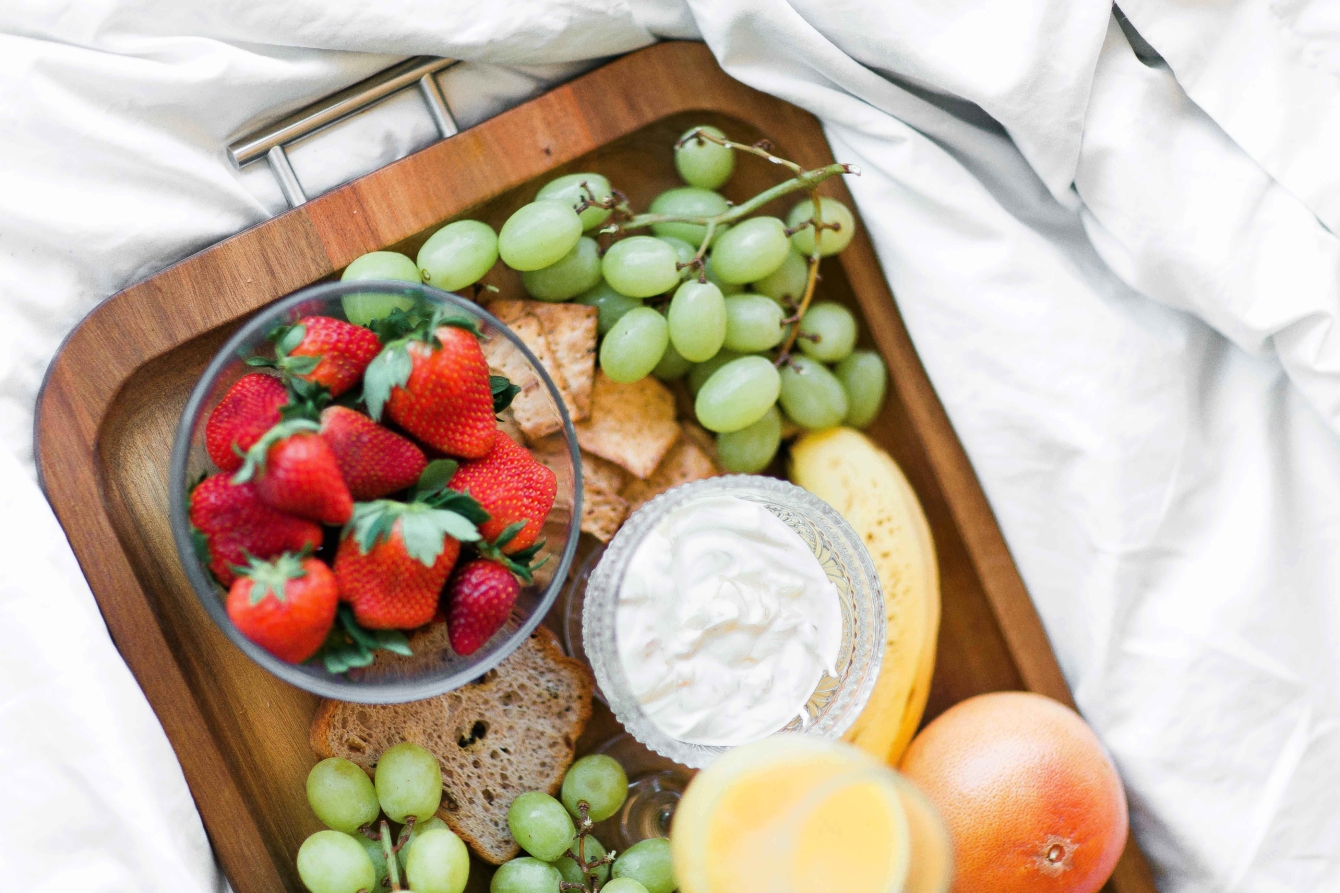
Tell us a little about your nutrition practice and how you run your nutrition business.
I have my own private practice on Harley St, London, where I see clients one-to-one and I specialise in weight management, gut health and autoimmune conditions. Due to the current climate I have moved my practice online and I am loving being able to help people across the globe because of it.
I also work with a number of corporates, specialising in offering workplaces health webinars to support their teams’ mental and physical health. I have worked with over 150 companies including Accenture, Adobe, Chanel, Deloitte, Ebay, Investec, Lloyds Bank and Lululemon.
How did you get into nutrition?
Growing up as a young adult, I suffered terribly with digestive troubles. After years of seeing many doctors, nutritionists, gastroenterologists, surviving many camera intrusions (in both ends) and being diagnosed with everything from candida to mental health concerns (I was told anxiety was the reason I couldn’t go a day without being in severe gastrointestinal pain and was told antidepressants were the solution), I decided to take my health into my own hands.
I spent months researching and reading forums (while studying history at university not nutrition!) before I finally managed to find out about a dietary principle from Monash University that had just been released — The FODMAP diet.
Through using myself as a guinea pig, I managed to find relief and eventually reduce my digestive issues that I had suffered with for years! I managed to get my mental, physical and social health back in check. Knowing what it was like to hit rock bottom with your health and feel like you are coming from a place where you’ve tried everything and found no solution, I realised I needed to somehow take this experience and help others.
Fast forward a few years on, I had re-trained in Nutritional Therapy (while working part-time in marketing) and the day I graduated was the day I saw my first client in clinic.
Who has had the biggest influence/inspiration on your practice?
Ah this is a hard one.
Personally, my husband was the one who supported my move to return to study again. I would never have had the confidence to do so if it wasn’t for him.
From an industry perspective, Dr. Mark Hyman and Amelia Freer are two of my absolute inspirations. Mark Hyman because I really appreciate how accessible he makes nutrition concepts. I fully support his practice of getting to the root cause of illnesses through functional medicine.
Nutritional advice is something people are more aware of but there are so many different approaches. Are there any key principles you would suggest as a good starting point?
1. Try to eat real food without labels. Foods that come from nature are what we are designed to consume. I always ask myself, would I find that in nature? And if not, do I want to consume that regularly? Most of the time it’s a no, and occasionally there is a yes (I love a good chocolate biscuit).
2. Drink more water. Most of us are dehydrated, which given that we are roughly 60-70% water, means that just a small change in the water we consume can have a huge impact on our bodies homeostasis. Water is crucial for every cell, organ and system in the body, and vital for us to function at our optimum state. When we are dehydrated, our energy creation, digestive system and food cravings all fall out of whack. So often, my clients are confusing thirst with hunger and end up snacking when all they need to do is drink more water.
3. Move daily – whatever your preferred form of movement is, from going on a walk to gardening or kickboxing, enjoy movement as part of your day-to-day routine. Physical activity is beneficial for both the mind and the body.
What is your go-to recipe at the moment?
Well, I have definitely had more time to experiment in the kitchen at the moment and have been finding some new go-to’s. However, I do love a banana bread – who doesn’t! I have it with my live coconut yogurt in the morning or with a cup of Tulsi tea in the afternoon. My latest banana recipe is a chocolate variety that is high in fibre, has no added sugars and is friendly for those on dairy free, gluten free and low carb diet. Recipe here.
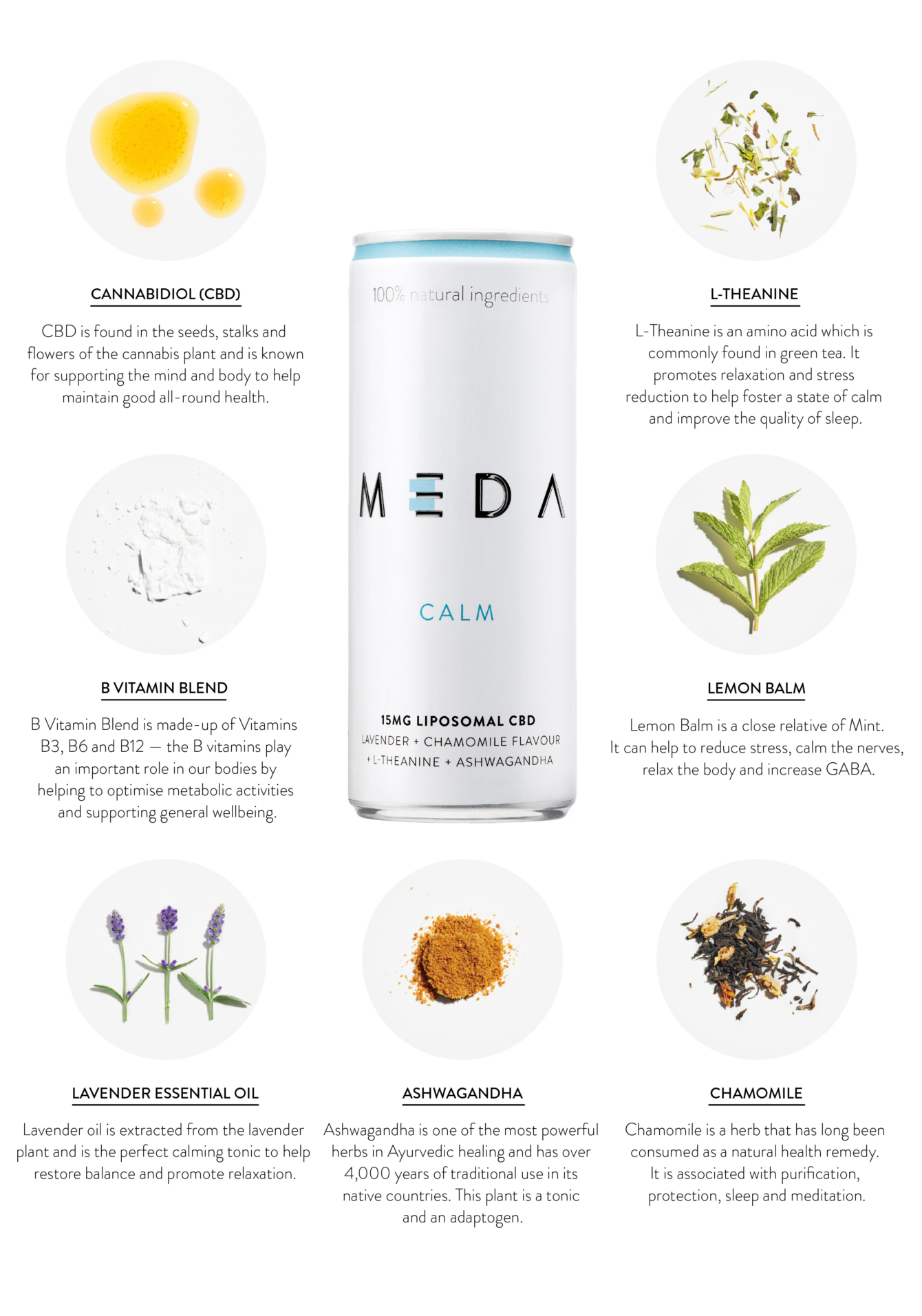
With mental health awareness week upon us, now more than ever we focus our attention to our mood and anxiety levels. In this current climate, we may find our anxiety levels triggered, our stress levels exacerbated and our moods swinging left right and centre.
Effective management of our anxiety involves a factor that is often forgotten – our diet! If you haven’t tried fine-tuning what you eat then you may be missing a significant opportunity to boost your mood.
Clarissa Lenherr, Registered Nutritionist, shares her top tips on managing your mood and anxiety levels through good nutrition.
Look after your gut health
Did you know that 90% of Serotonin, the hormone that is responsible for feelings of wellbeing and happiness, is created in the digestive system? Pretty impressive right! Alongside that, emerging evidence is showing that our commensal bacteria in the gut can create GABA (a neurotransmitter responsible for feelings of calm), and plays a role in reducing anxiety.
To look after your digestive system and bacterial ecosystem that live within it, you want to ensure you are getting in 30g of fibre every day, chewing your food thoroughly and eating lots of prebiotic and probiotic foods. More info in Clarissa’s recent post here https://medahuman.com/daily-dose
Balance your blood sugar
Ever heard of the blood sugar rollercoaster and wondered what this means to you? Well, when our blood sugar (glucose in the blood that gives us energy) is peaking and dropping all day long, our energy levels fluctuate and our mood can often follow suit. For example, ever felt your anxiety levels are more pronounced when you are tired? Felt your mood is lifted after eating and drops an hour after? That’s all thanks to your blood sugar. To avoid yo-yo energy and mood levels all day, we want to eat well balanced meals at every opportunity, to give us a slow, consistent release of energy.
Try and aim for this breakdown of macros on your plate:
- ¼ of your plate should be protein – tofu, beans, red meat, poultry, eggs, fish or shellfish
- ¼ of your plate complex carbohydrates which are full of fibre – brown rice, quinoa, oats, starchy veg
- ½ your plate veggies galore!
- 1 tbsp of good fats such as olive oil, avocado, nuts and seeds
Reduce/avoid caffeine
When we consume caffeinated foods or drinks, it prompts us to secrete our stress hormone cortisol. This is fine in moderation, but too much cortisol can trigger anxiety, mood swings, irritability and even headaches, nausea and jitteriness for some.
The maximum recommended intake of caffeine is 400mg which is about eight cups of lightly stewed green/black tea or four espresso shots. And if you notice that caffeine triggers your anxiety, try to reduce your consumption even further. But don’t go cold turkey! Taper off over time, as cutting out caffeine abruptly can trigger headaches, mood swings and malaise for some people.
Try swapping with non-caffeinated alternatives such as chicory root coffee, naturally non-caffeinated herbal teas such as peppermint or turmeric lattes.
Consider green tea
Adaptogenic herbs may be your go-to. Rhodiola, Ashwagandha, Holy Basil and Reishi mushrooms have all been shown to help support your body when it is stressed and this in turn can help reduce the onset of anxiety or mood changes. Check out MEDA’S CALM blend which contains Chamomile, CBD and Ashwagandha, all of which may help to manage your anxiety levels and promote relaxation. Read more about adaptogens and their benefits here https://medahuman.com/ashwagandha
Discover MEDA calm
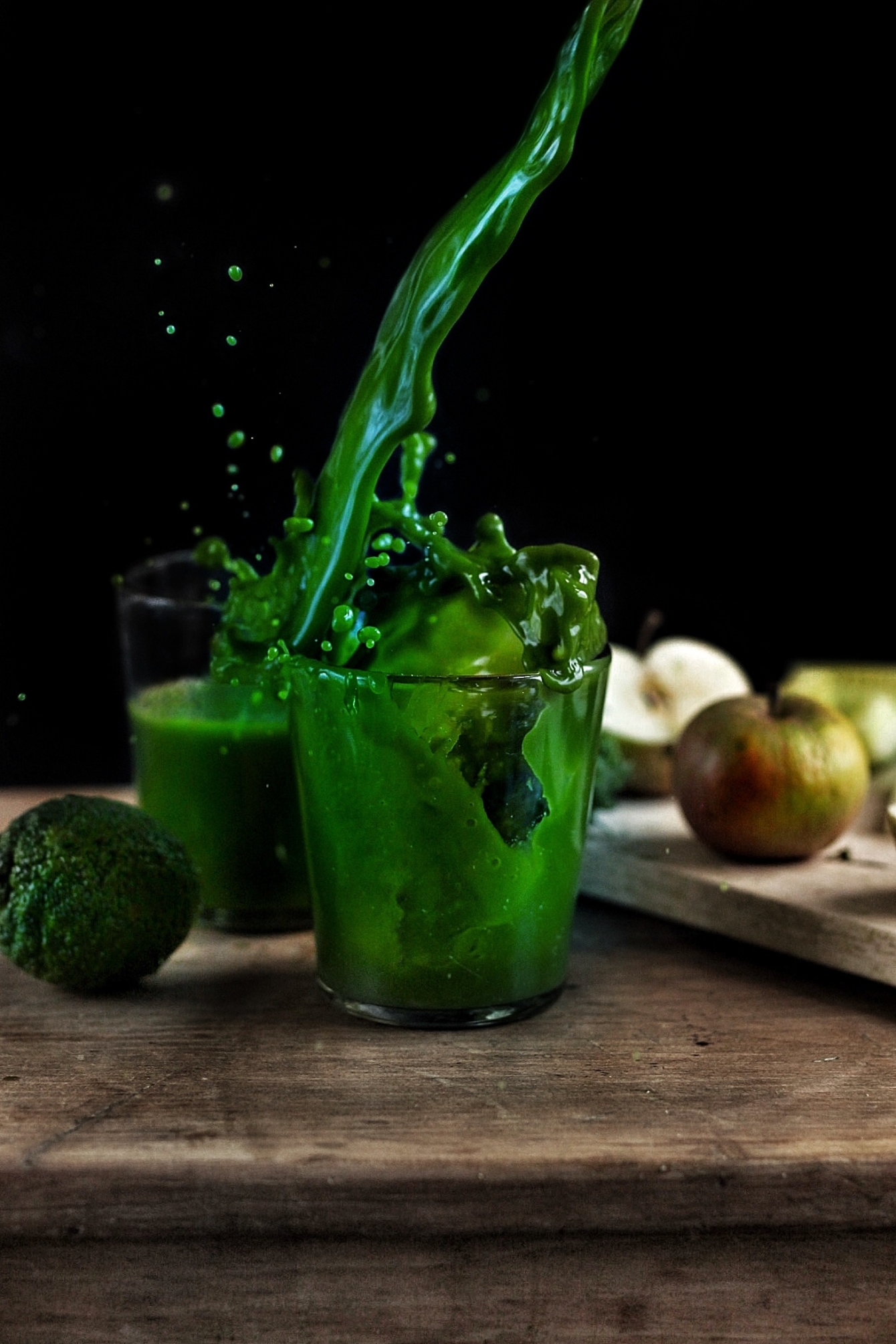
Image : Michelle Norée
Whether you’re a student hoping to nail your exams, a driven professional striving for a promotion, or an adult concerned about cognitive health, the idea of taking a pill or tincture that boosts your brainpower might seem pretty appealing. So, it’s not a surprise that nootropics, aka cognitive enhancers, are getting a good deal of attention. But do they work and are all nootropics created equally?
WHAT ARE NOOTROPICS?
Nootropics is an umbrella term for anything from herbs and micronutrients to supplement blends and prescription drugs that are touted as smart drugs, used to optimize your mental performance, reduce stress, and decrease your risk of cognitive decline. Some popular ones that might ring a bell include Turmeric, Ginseng, Green Tea and Caffeine.
HOW DO THEY WORK
The key thing to remember is that nootropics are enhancers rather than fixers. They work to support cognitive function, not fix it. And different nootropics work their magic in different ways. Some work to bring calm and clarity due to their influence on cortisol (our stress hormone) whilst others help promote focus and mental performance through their impact on neurotransmitters. However, don’t expect a quick fix overnight! Natural nootropics work their best when built up over time. Work by starting low and slow, which will allow you to intuitively feel if they work for you or not.
OUR FAVOURITES
Here at MEDA, we are a fan of incorporating botanical nootropics to our beverages for the very reasons above! A few of our favourites include:
- L-Theanine, found in MEDA CALM, works as a relaxant that can reduce heart rate and blood pressure, improve concentration and promote alpha brainwaves (associated with relaxation).
- Caffeine, found in MEDA FOCUS, can work on the brain by blocking the action of adenosine, a chemical that promotes sleep. When you consume caffeine, you reduce fatigue which in turn can make you feel more energised and alert. This can lead to an increased sense of focus and… ta-da!
- Turmeric, found in MEDA Recover, has an active component called curcumin which has been suggested to potentially act as a neuroprotective antioxidant, reducing inflammation and boosting mood, especially in cognitive decline or other mood disorders.
- Panax Ginseng, found in MEDA FOCUS, has been used for centuries as natural performance enhancer. Studies have suggested that Ginsenosides found in Ginseng can potentially help with memory, calmness and learning. Check out our spotlight on Panax Ginseg for a deeper read. https://medahuman.com/spotlight-panax-ginseng
If you are considering supplementing with nootropics, do talk to a health professional
before guzzling down your brain-boosting pills with your hot water and lemon.

With British Summertime approaching most of us are wondering when exactly lockdown will be lifted rather than making our usual summer season plans. Right now it can be hard to fire up the brain and trigger that get-up-and-go attitude and motivation. Instead of reaching for multiple cups of joe or fuelling up on sugar laden baked goods (once in a while is fine, obv) have a read of our top four strategies to get your energy, focus and butt into gear!
Choose brain-boosting foods
Foods rich in omega-3 fatty acids, such as oily fish (mackerel, salmon, anchovies) avocado, walnuts and flax seeds can benefit mood, memory, and importantly, cognition function. Feel focused after a bowl of vibrant berries or a superfood salad with broccoli? This might be the reason. These colourful vegetables and fruits contain antioxidants that can help boost brain function. Aim for three portions of omega rich foods a week and try to consume as many colours and varieties of fruits and vegetables as you can.
Hydrate to feel great
Your brain is approximately 80% water. Expectedly then, poor hydration can negatively affect your ability to concentrate and focus. Additionally, dehydration can lead to reduced energy, headaches and low mood. Studies have shown that even slight hydration of 1-2% can reduce short term memory! Stay hydrated by aiming to drink 1.5 to 2 litres of water every day. A top tip – add berries, herbs (see rosemary below) or cucumber to get your palette going.
Balance your blood sugar
Our brains require a huge deal of energy to function. While the brain is only 2% of the total body weight it requires 20% of the energy we intake from calories! For sustained focus, it needs a constant supply of energy delivered via the blood. This is mostly commonly supplied by glucose broken down from the foods we eat.
Refined sugars and carbohydrates spike our blood sugar, sending us on a blood sugar and energy rollercoaster. When our energy then dips, we can lose concentration and energy and find our cravings for quick fix sugary foods increases.
Instead, swap to complex carbohydrates including wholegrains such as brown rice and quinoa, and combine these with a source of healthy fats, protein and fibre. This combination will mean that the energy from the food you eat will be slowly broken down and released at a sustained rate, providing your brain (and your body) energy for hours.
Get your kick from herbs & spices
Ginseng is probably the most well-known adaptogen herb, and has been a staple of Chinese medicine for centuries. Studies have actually shown that a single dose of ginseng can improve people’s cognitive performance and attention during stressful tasks. Get your dose in the Meda FOCUS which is teamed with focus enhancing espresso and CBD.
One of the earliest documented benefits of Rosemary, is its ability to stimulate cognitive function. Studies have shown that rosemary can help with memory and concentration. So instead of that mocha-ice- almond milk Frappuccino or sugar filled energy drink (we won’t name and shame), you can opt for a Meda FOCUS that boosts your focus with natural herbs and spices, without the blood sugar energy rollercoaster.
The active component of turmeric is curcumin, which is famed for its multiple health benefits including its anti-inflammatory and immune boosting effects. Studies have also shown that this multi-talented spice can boost BDNF, a brain hormone that is responsible for the growth of neurons and help prevent degenerative processes in the brain.